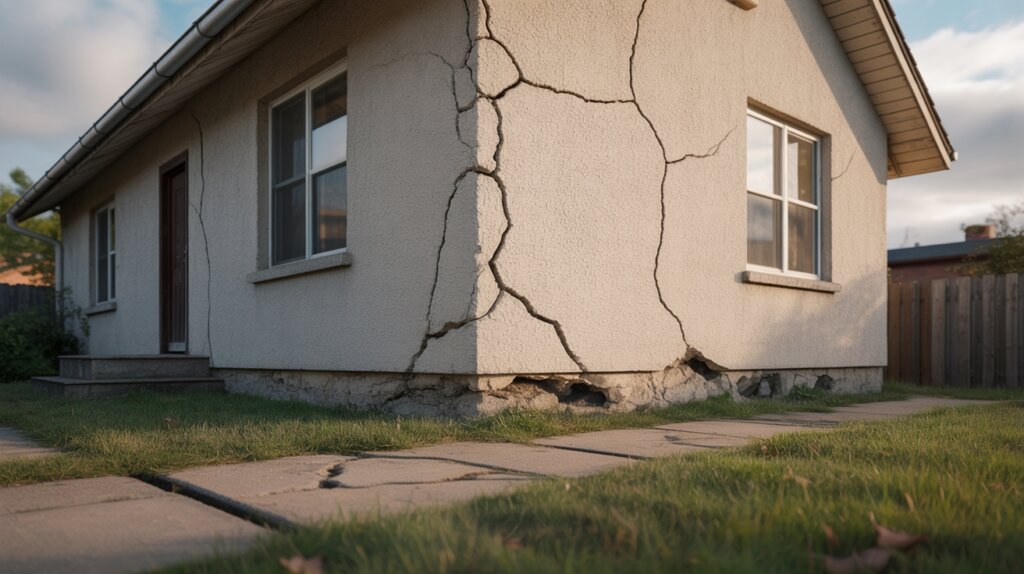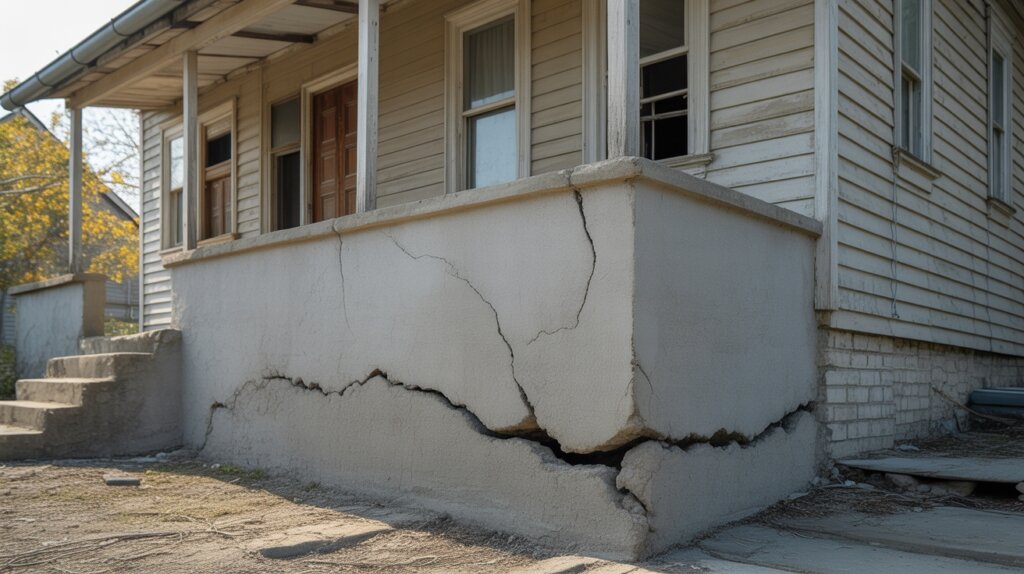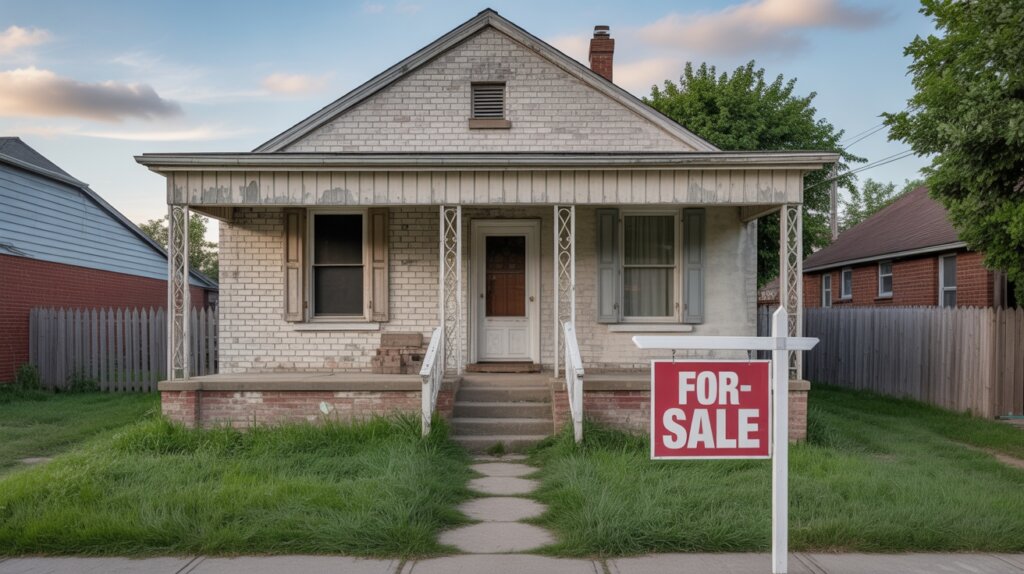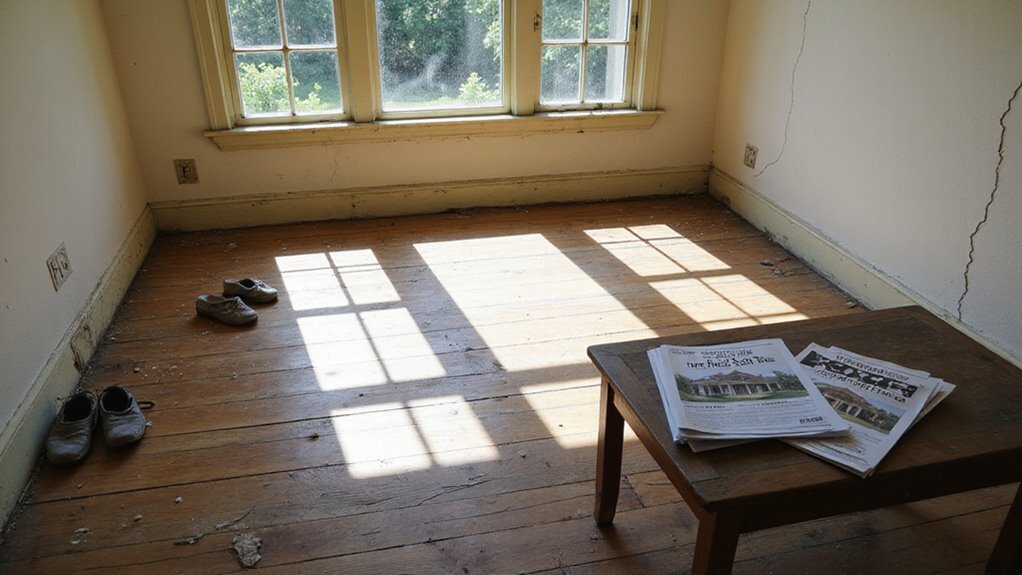Selling a house with foundation damage is tough. Many buyers fear costly repairs or hidden issues. You may worry about losing money or finding any buyer at all.
This fear can make your home sit on the market for months. Potential buyers may walk away after inspections or demand huge discounts. You might feel stuck with a property that feels unsellable.
You can sell a house with foundation damage as-is by being honest, pricing it right, and targeting the right buyers. With the right steps, you can avoid major losses and close a deal faster. This blog will show you simple ways to sell your damaged house and protect your interests.
Key Takeaways
- Disclose all known foundation issues honestly to potential buyers and include relevant inspection or repair reports.
- Price the home realistically, factoring in repair costs and comparing to similar local properties with foundation problems.
- Market the property to investors, cash buyers, or renovation-minded buyers who are more likely to purchase as-is homes.
- Work with a real estate agent experienced in selling homes with significant defects and as-is transactions.
- Prepare thorough documentation, including disclosures, repair quotes, and permits, to build buyer confidence and streamline negotiations.
Understanding Foundation Damage and Its Impact on Home Value

Foundation damage can lower your home’s value. Buyers and lenders worry about safety and lasting problems when they see cracks or uneven floors. If foundation issues exist, the home may sell for less money. Foundation issues make buyers and lenders cautious, often leading to a lower sale price and concerns about long-term safety.
Foundation settlement is not just about looks. It often means there are bigger structural problems. Even small signs can make buyers feel unsure about the property’s future. Conducting a thorough title search can reveal underlying issues that influence a buyer’s confidence.
If you plan to sell a home with damage, you may get fewer offers. You might also receive lower prices. If you repair the foundation, you could attract more buyers and raise the sale price.
Understanding how proper valuation impacts sale strategies can help you better navigate the decision to repair or sell as-is. If you know how foundation damage affects value, you can make better decisions. This knowledge helps you set fair expectations. It also guides you on whether to sell as-is or make repairs.
Identifying the Signs of Foundation Problems
Foundation problems have clear warning signs that you can spot early. Cracks in walls and uneven floors are common indicators. Sticking doors or windows may also point to issues. Gaps around window frames or exterior doors are signs to watch for. Separation between walls and ceilings can show foundation movement. Persistent moisture or water near your home’s base may signal trouble.
If you notice any of these signs, consider a professional inspection. An expert can determine the severity of the problem. Early detection helps you plan repairs and sell your house with fewer surprises. Additionally, understanding the types of liens that could be associated with foundation issues can help in managing potential legal or financial complications. Recognizing the signs of structural damage early can save you time and money during the sale process.
Evaluating the Severity of the Damage

You need to know how serious the foundation damage is before making any decisions. A professional assessment gives a clear answer about the damage. This step helps you understand if the problem is small or if it threatens your home’s safety. Proper inspection reports ensure that all potential risks are identified and documented accurately. An licensed structural engineer should inspect the foundation. The engineer looks for cracks, settling, or shifting.
Their report explains the main cause and lists if repairs are needed. If you rely only on what you see, you might miss hidden issues. An expert’s opinion helps you know the real cost of possible repairs. Accurate information helps when talking to buyers, appraisers, or contractors. Knowing the damage lets you set fair expectations. You can make better decisions about repairs or selling. This knowledge helps you plan your next steps wisely, especially considering how title issues could impact the sale process.
Deciding Whether to Repair or Sell As-Is
You can either fix the foundation damage before selling or sell the house as-is. Repairing first can help you get a higher price and attract more buyers. Selling as-is is faster and easier, but you may get less money. Additionally, selling as-is can help you avoid the appraisal process, which might undervalue your home due to foundation issues. If you repair the foundation, you may need to wait for the work to finish. This choice could delay your move and require you to stage your home. It usually appeals to buyers who want a move-in ready house.
Selling as-is lets you avoid repairs and sell quickly. If you choose this, you will likely attract investors or cash buyers. They often expect to pay less for a house with problems. Consider what matters most to you. If you want speed and less hassle, selling as-is is best. If getting the highest price is your goal, consider making repairs first. Being transparent about the foundation’s condition and understanding the extent of the foundation issues can significantly influence your selling strategy and negotiations.
Calculating Repair Costs Versus Selling As-Is

To decide between repairing foundation damage or selling as-is, compare the total costs and benefits. Repairs can be expensive and may delay your sale. Selling as-is often brings a lower offer but avoids repair costs. Market conditions can significantly influence whether repairs are a worthwhile investment or if selling as-is is more practical. Quick cash offers can provide a fast solution, especially if you need to sell promptly.
A professional should inspect your home to assess the foundation damage. If repairs are minor, fixing them might boost your selling price. Severe damage may cost tens of thousands to repair. If you want to avoid hassle and upfront costs, selling as-is is an option. You may lose some money but save time and effort. Weigh your priorities before making a decision.
Legal Disclosure Requirements for Foundation Issues
You need to understand your state’s laws and regulations regarding disclosure of foundation problems when selling your home. As the seller, you’re legally obligated to inform buyers of any known foundation issues, and failing to do so can lead to serious penalties or lawsuits.
Protect yourself and the transaction by handling disclosure requirements strategically from the start. Considering the current market value of your house can also influence how you approach these disclosures and negotiations. Being aware of your local disclosure laws ensures you remain compliant and avoid potential legal complications.
State Laws and Regulations
Most states require sellers to tell buyers about any known foundation problems. These rules exist because foundation issues can affect value and safety. Sellers must be honest about any damage before closing.
If you hide or lie about damage, you could face legal trouble. This may include paying fines or having the sale canceled. Each state has different rules, so check the laws where you live.
Local zoning rules may affect repairs or changes to your property. These rules might also decide if you can sell the home as-is. Always learn about your local laws before making decisions.
If you are unsure about the requirements, talk to a real estate lawyer. Following the rules protects you and sets clear expectations for buyers. This makes selling your home smoother and safer.
Seller Disclosure Obligations
You must tell buyers about any foundation issues when selling your home. Most states require sellers to disclose major problems like this. If you hide defects, you could face legal trouble later.
Home staging or repairs do not remove your duty to disclose. You must honestly fill out the seller disclosure form. Provide records of any repairs or inspections if possible.
Buyers or their inspectors may find hidden problems. If you disclose issues early, you protect yourself from future disputes. Honest communication helps the sale go smoothly.
Penalties for Non-Disclosure
Failing to disclose foundation issues can lead to legal and financial trouble for sellers. Buyers may sue for damages or cancel the contract. Some states may also require sellers to pay for repairs.
Penalties depend on state laws and can include large fines or court-ordered payments. Punitive damages may apply if sellers hide problems on purpose. Real estate authorities will investigate if buyers report hidden issues.
Full disclosure protects sellers from future lawsuits and helps during negotiations. If you ignore disclosure rules, you risk losing money and damaging your reputation. Always follow your state’s disclosure laws to avoid penalties.
Setting a Realistic Asking Price
To set a realistic asking price, start by comparing your home to similar properties in your area that also have foundation issues. You’ll want to factor in professional repair estimates so buyers immediately see you’ve accounted for the cost of fixing the damage. This approach positions your listing competitively and helps attract serious, qualified buyers.
Additionally, understanding the step-up in basis can help you better assess your property’s value relative to potential tax implications upon sale. Considering the potential for undisclosed liens or legal defects can further inform your pricing strategy and ensure transparency.
Assessing Market Comparables
When selling a home with foundation damage, check recent sales of similar local homes. Focus on properties with the same structural problems. This will give you a realistic idea of your home’s value.
If you compare only final sale prices, you might miss important details. Consider how long each house stayed on the market. Also, look at any price changes before the home sold.
Local market conditions can make a big difference. Choose homes in your neighborhood for the best comparison. If you use these facts, you can set a fair price and attract serious buyers.
Factoring Repair Estimates
Factoring repair estimates helps you set a fair price for your home. You should get written repair quotes from trusted contractors. These quotes let you show buyers real costs and explain your pricing.
If you are honest about repairs, buyers may trust you more. Always subtract the estimated repair cost from your home’s market value. You can also offer incentives like paying closing costs if needed.
Home staging and curb appeal can still matter even with foundation issues. A clean and welcoming home can attract more buyers. Strong presentation and honest pricing can help you sell your home faster.
Marketing Strategies for Homes With Foundation Damage
Selling a home with foundation damage requires special marketing strategies. You should focus on the home’s potential for renovation and improvement. If buyers know the issues, they may see the chance to customize the space.
Photos should highlight the best parts of the home, such as natural light or a modern kitchen. You can stage rooms to make them look larger and more inviting. Honest listing descriptions help build trust with buyers.
If you are open about the foundation problems, buyers may feel more confident. Some buyers look for homes they can upgrade or repair. You can attract motivated buyers by focusing on what the home can become. Additionally, asking for too much money can deter potential buyers, so pricing the home correctly based on market research is essential.
Attracting Investors and Cash Buyers
To sell a house with foundation damage quickly, focus on investors and cash buyers. These buyers often purchase homes with structural issues. They usually move fast and pay in cash.
If your property is in a good area, highlight its location. Mention nearby amenities, schools, or future projects. A strong location can still attract buyers despite damage.
Staging your home can show its layout and potential. Buyers may see how the property could look after repairs. Use simple staging to help them imagine future value.
Be honest about foundation problems in your listing. Provide inspection reports if you have them. Investors and cash buyers appreciate clear and direct information.
If you keep the process simple, buyers may act quickly. Show the possible return on investment. This approach can help you sell the property despite its current issues.
Working With Real Estate Agents Experienced in As-Is Sales
You need an agent who knows how to market homes with serious flaws and can prove their track record in as-is sales. Make sure they understand how to position your property and negotiate terms that protect your interests. With the right expertise, you’ll attract more serious buyers and maximize your sale outcome.
Identifying Qualified Agent Expertise
A qualified agent should have proven experience selling homes with foundation issues. This expertise helps you face the challenges of selling as-is. The right agent can increase your chances of a good sale.
You should check if the agent has sold as-is properties before. Local investor connections are helpful if you want a quick sale. Agents who use creative staging can make even damaged homes look better.
Community involvement can help your agent find more buyers. Clear and honest communication is important throughout the process. If your agent fits these criteria, you can avoid surprises and highlight your home’s strengths.
Negotiating Effective Listing Strategies
To sell a home with foundation damage, you need a clear listing strategy. Your agent’s experience helps you price the home fairly. If you stay honest about the home’s condition, you attract serious buyers.
Home staging can highlight the best features and make flaws less noticeable. Your agent may suggest open houses for investors or buyers who want as-is properties. These steps help show the home to the right people.
If you focus marketing on the right audience, you save time. Honest marketing builds trust with buyers. If feedback is negative, you and your agent should update your plan quickly.
Negotiating Offers From Potential Buyers
Sellers can still get a good deal even if buyers know about foundation issues. You must address buyer concerns, highlight your home’s strengths, and use clear market data. Always be ready to show your property’s value despite its flaws.
Home staging can help buyers see the home’s potential. If you require mortgage pre-approval, you will attract only serious buyers. This step is important because lenders may be cautious about properties with damage.
You should set your asking price using recent market data. Providing repair estimates can make costs clearer for buyers. This reduces uncertainty and helps buyers feel more confident.
Stay firm on important terms, but be open to negotiate less critical details. If you remain flexible, you may reach a better agreement. Smart negotiation can lead to a good outcome, even with foundation problems.
Preparing Essential Documentation for the Sale
Good documentation is important when selling a house with foundation damage. It shows buyers what work has been done and what issues remain. If records are clear, buyers may feel more confident about the purchase.
Homeowners should gather permits, warranties, and receipts for any repairs or upgrades, especially those related to the foundation. Inspection reports and expert opinions are also useful if questions come up. If you include details about the foundation damage, you meet legal requirements and build trust.
Information about interior improvements or other upgrades can help highlight the home’s value, even if repairs are needed. Organized paperwork makes the selling process smoother. If you provide complete documents, negotiations may go faster and with fewer problems.
Navigating the Home Inspection Process
As you approach the home inspection, expect foundation damage to trigger immediate red flags for buyers. Be upfront about the issues and provide all relevant disclosures to build trust. When inspection results come in, use a clear strategy to negotiate repairs or price adjustments, keeping your goals in focus.
Common Inspection Red Flags
Home inspectors look for signs of foundation problems. If they find issues, it can affect your home sale or negotiations. Knowing what they check can help you prepare.
Inspectors watch for wall cracks, especially above doors and windows. Uneven or sloping floors are also a concern. Sticky doors and windows can signal foundation trouble.
They also check for past repairs without proper records. Water near the foundation or signs of moisture are red flags. If you fix these issues, you can improve your chances of a smooth inspection.
If you cannot fix every problem, be ready to explain them. Proper preparation helps you defend your price or adjust your strategy. Understanding these red flags makes the process less stressful.
Disclosing Damage to Buyers
If your home has damage, you should tell buyers about it. Disclosing problems builds trust and helps avoid surprises. Buyers and inspectors will likely find issues, so honesty is best.
Sharing information early can help you control the conversation. You can explain repairs or improvements you have made. This can make your home more appealing to buyers.
Incomplete or false disclosures may cause legal trouble or stop a sale. If buyers know the facts, they are more likely to feel comfortable. Being open leads to a smoother selling process.
Negotiating Inspection Findings
When a home inspection finds foundation damage, negotiations become important. Buyers may ask for repairs, lower prices, or other changes. Sellers must act carefully to protect their interests.
A recent property appraisal can support your asking price if buyers question it. If you offer a home warranty, buyers may feel more confident about future repairs. Contractor estimates can show the real cost of fixing the damage.
Sellers should be flexible, but must know their lowest acceptable price. If you must sell as-is, make this clear from the start. Good negotiation can help both sides reach a fair agreement even with foundation issues.
Closing the Sale and Transferring Ownership
When closing a sale and transferring ownership of a house with foundation damage, follow certain steps. The process starts when you and the buyer agree on terms. The buyer’s lender must approve the home appraisal, even with known defects.
If the appraisal affects the value, both parties may need to adjust the final price. The buyer also needs to get property insurance. Some insurance companies may refuse coverage due to structural problems.
Work with your real estate agent and closing attorney to complete all required paperwork. All disclosures must be signed and funds placed in escrow. On closing day, review every document before signing the deed transfer.
Partner closely with your agent and attorney, sign all disclosures, and carefully review documents before transferring the deed on closing day.
After funds clear, you can give the keys to the buyer. If you anticipate these steps, closing the sale should go smoothly, even with foundation issues.
Conclusion
If you need to sell a house with foundation damage, you can still find the right buyer. If you price the home fairly and explain the issues, you may attract investors or buyers looking for a project. If you share all the details honestly, you can avoid surprises during the sale.
If you want to skip repairs and sell quickly, you can consider cash buyers. If you work with a company like ours, you can sell your house as-is for cash. If you choose this route, you can avoid expensive fixes and lengthy waiting times.
If you are ready to sell your house with foundation damage, we can help. We buy houses for cash in any condition. Contact Greg Buys Houses today to get your free, no-obligation offer.

